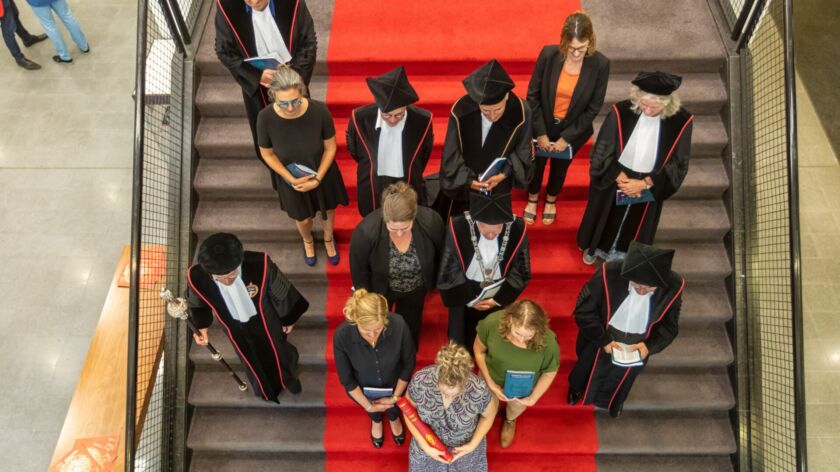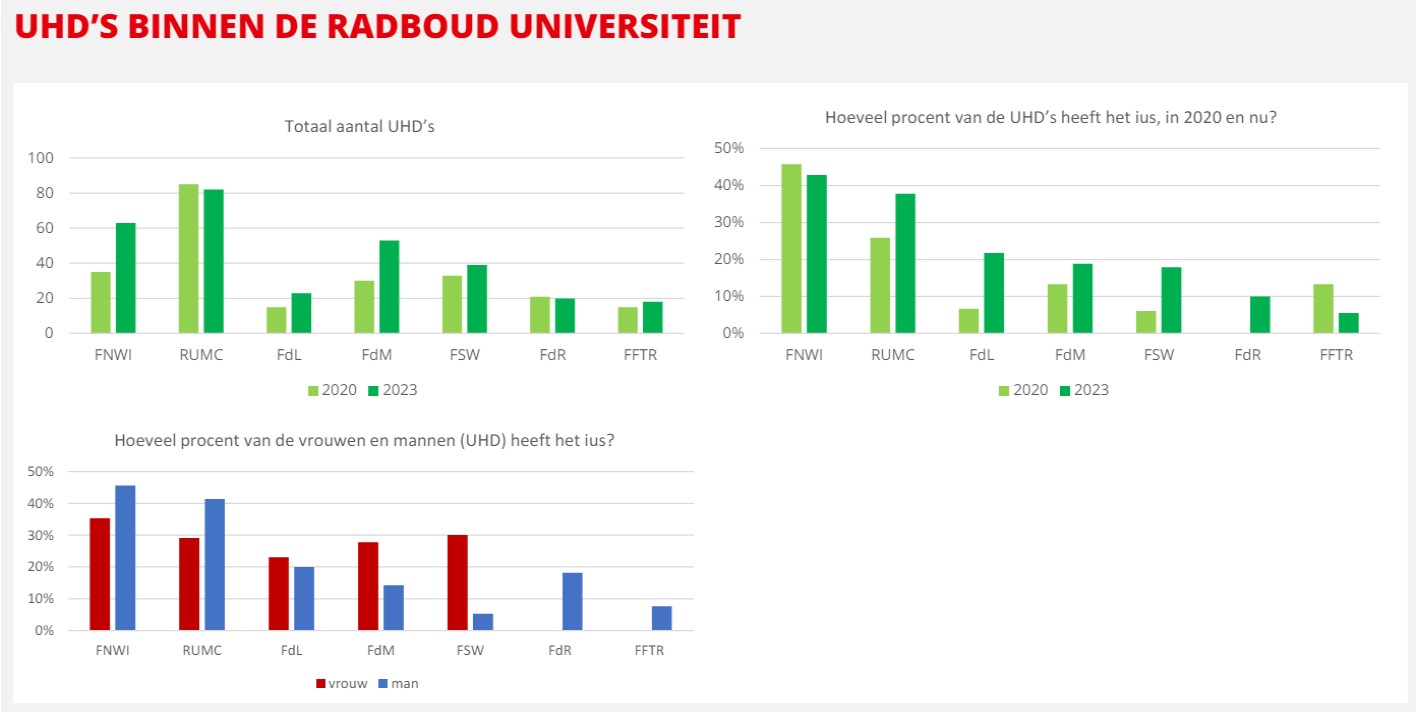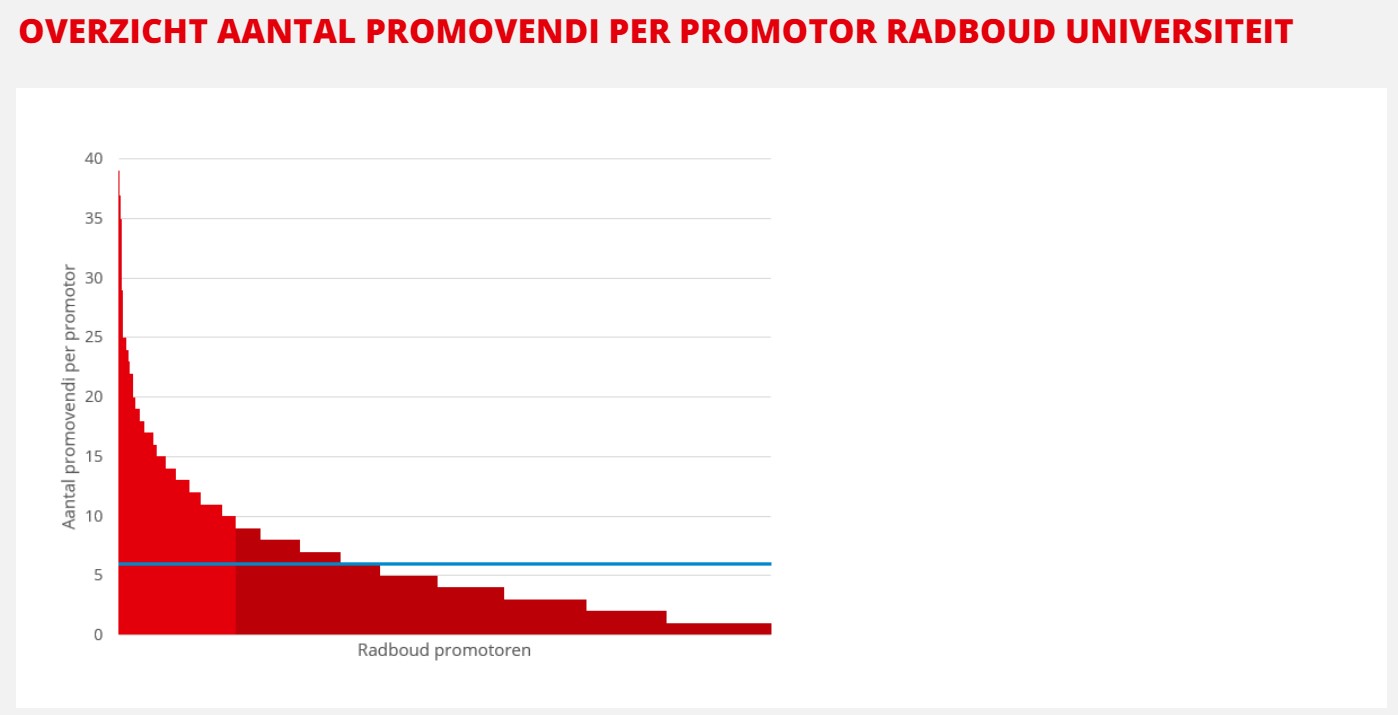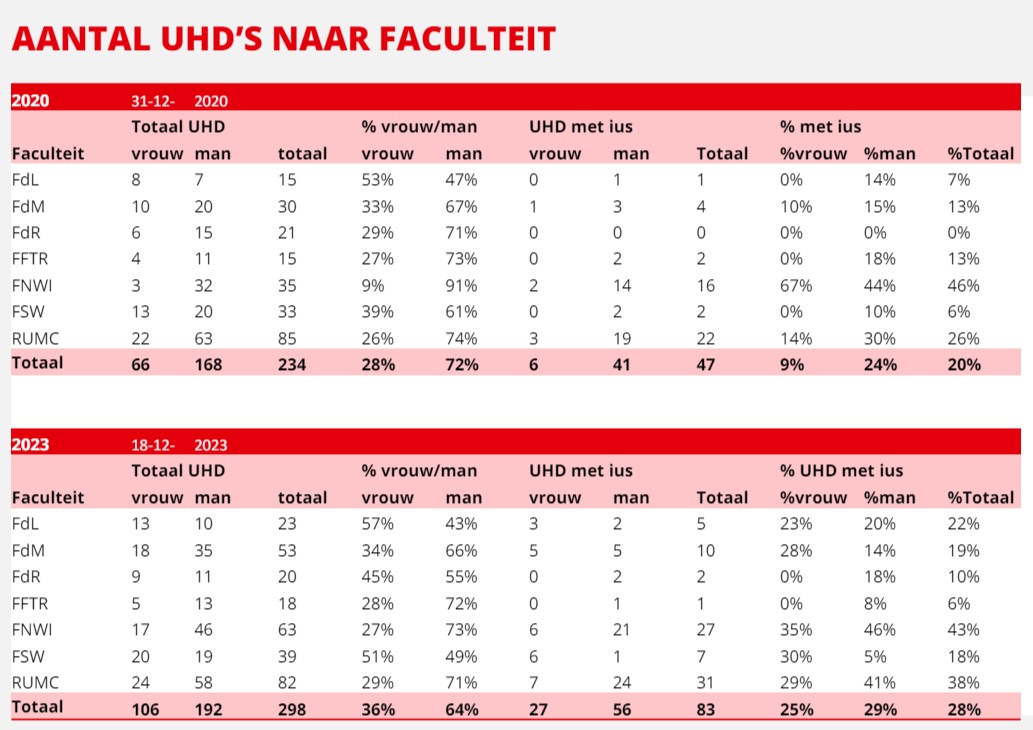Radboud Young Academy: ‘Grant all associate professors the right to supervise PhDs’
-
 Een promotie aan de Radboud Universiteit. Foto: Dick van Aalst
Een promotie aan de Radboud Universiteit. Foto: Dick van Aalst
Two members of the Radboud Young Academy have called for all associate professors to have the ius promovendi. They made this claim to the Executive Board, after charting PhD supervisory rights at Radboud University. ‘Some promotors supervise over thirty candidates.’
Radboud University has always been very reluctant when it comes to appointing PhD supervisorship to associate professors. That is a missed opportunity, according to Mariska Kleemans and Mark Dingemanse of the Radboud Young Academy.
The ius promovendi is the right to supervise PhD candidates and grant them a doctorate. For the longest time, this right was reserved for full professors in the Netherlands (unlike in surrounding countries). However, more and more universities offer their associate professors the same opportunity. The idea is to give this group of scientists more recognition and appreciation for the work they’re already doing, which should also make careers in academia more appealing.
Kleemans and Dingemanse charted the distribution of the ius promovendi at the university in Nijmegen. Working together with the Academic Affairs department, they requested figures for every faculty and put them together in a chart. ‘Alarm bells started to ring’, according to Dingemanse, who is both a linguist and associate professor.
Five times co-supervisor
The study shows that there are major differences between the faculties when it comes to assigning the ius promovendi. In 2023, a little over 40 percent of the associate professors had the right to supervise PhDs at the Faculty of Science; that number was slightly lower at the Faculty of Medical Sciences. Meanwhile, at the Faculties of Arts, and Social Sciences, as well as the Nijmegen School of Management, the number of associate professors hovered around 20 percent. ‘Even though many people without the ius promovendi are busy supervising PhDs anyway’, according to Kleemans, who recently became professor in Youth, News, and Education.

The faculties also turned out to maintain different criteria for granting those rights. ‘One faculty requires you to have been a co-supervisor at least five times, while another faculty requires two times’, Kleemans says. ‘At my faculty (Social Sciences, eds.) it recently became possible for any associate professor to apply for the ius promovendi. However, I have been told by some female associate professors that they think it’s too much work and that that is why they refrain.’
Not surprising, according to Dingemanse. ‘Research has shown that this setup will predominately lead to male applicants.’ That is why Dingemanse refuses to apply for the ius promovendi on principle. ‘Let’s change policies first’, he says.
Across Radboud University, 29 percent of male associate professors have the ius versus 25 percent among female associate professors. Dingemanse states that this, too, is a consequence of the current system. ‘When someone higher up in the hierarchy – be it a professor, research director, or dean- can decide that you’re not yet ready for the ius promovendi, bias can creep into the system; gender bias, for instance.’
Uncomfortable
The most striking conclusion from the study, Dingemanse continues, is the overview of the number of candidates per PhD supervisor. On average, promotors at Radboud University have six candidates. ‘But the graphs show that some have over twenty candidates, and a few even have more than thirty. With that many PhD tracks, meaningful supervision becomes simply impossible for promotors. Associate professors are saddled with the lion’s share of the work.’

According to Dingemanse, a consequence of the sparse allocation of the ius is that only a small portion of the university community can serve as supervisors. ‘At my faculty (Arts, eds.) that means that, as a potential PhD candidate, you will have to scout for a supervisor. This is not always successful. It often means that you will have to ask someone who already has ten other candidates. The day-to-day work then has to be done by assistant- and associate professors, while the full professor gets all the credit. Of course, many professors do this with the best of intentions; it’s simply how the system works. The fault lies not with the people, but with the system.’
Full professors at Radboud University are automatically granted the ius promovendi; it does not automatically come up in job interviews. ‘That means that there are professors who have the right to supervise, despite never having co-supervised before’, Kleemans says. ‘I have the ius, despite only having supervised one candidate so far. Although, this was firmly questioned by the Appointment Advisory Committee in my appointment, it still feels uncomfortable that I have the ius promovendi as a professor, while I didn’t have it as an associate professor.’
Belgium and Germany
According to the two members of the Radboud Young Academy, the solution is simple: grant the ius promovendi to all associate professors who have been co-supervisors several times. ‘The exact number is something we hope to discuss with the Executive Board. However, we want to make a university-wide agreement; it should not depend on at which faculty you work’, says Kleemans.
Gowns
As of September 2023, at Utrecht University, all members of a PhD committee are allowed to wear gowns, even those without a full professorship. How do the members of the Radboud Young Academy feel about this?
‘I’m not opposed to the idea’, Dingemanse says. ‘But it shouldn’t be an empty gesture. I would not want our university to do the same without also granting the ius promovendi to all associate professors.’
Kleermans agrees. ‘If being able to wear a gown is an excuse to avoid granting the ius, then I am obviously opposed to it. Professors wearing gowns is somewhat awkward in any case; it convey a hierarchy to the room.’
If this does not happen, Radboud University runs the risk of falling behind, according to both scientists. In other countries, such as Belgium and Germany, all associate professors can be PhD supervisors. ‘We’ve heard of numerous people who had the ius abroad, but don’t have it here’, Kleemans says. ‘That is not good for the international standing of our university.’
Some Dutch universities are catching up. Maastricht University and the TU Delft have both granted the ius to associate professors for some time now. Recently, Groningen University followed suit. In Groningen, all professors now have the right to supervise PhD tracks. ‘We are lagging behind’, as stated by Dingemanse. ‘We need to change course. Granting more people the ius promovendi would fit with the University motto (‘You have a part to play’, eds.) . Associate professors are doing the work anyway; they deserve the recognition and rewards.’
Translated by Jasper Pesch
‘Decision regarding broadening ius promovendi to be made this year’
The doctorate board is familiar with the differences between faculties when it comes to the ius promovendi, according to a university spokesperson. ‘The doctorate board wants to evaluate the situation and hopes to decide on the broadening of the ius promovendi this year. The wishes of the Radboud Young Academy will be considered. The issue is also part of the agenda of the rectors’ College of Dutch Universities.’




